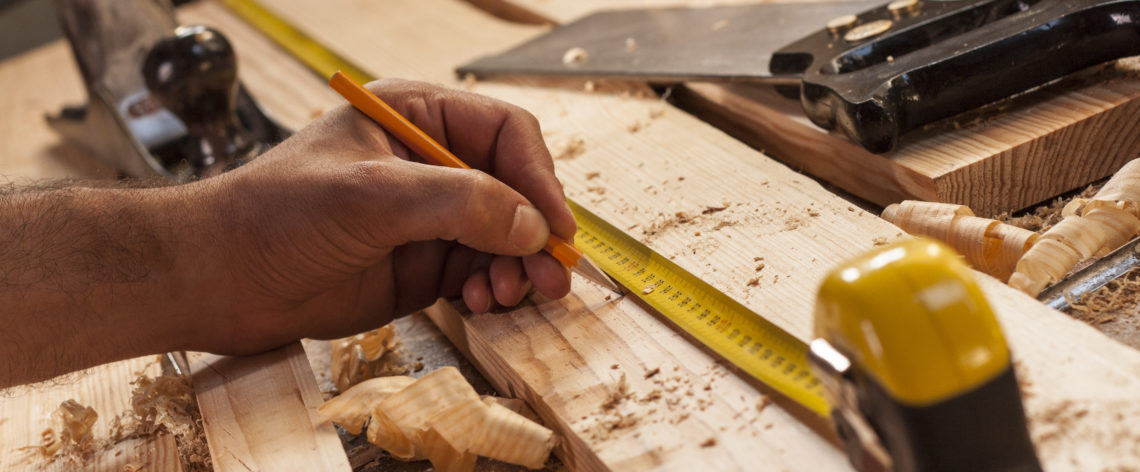Was woodwork your favourite subject at school, and do you love working and creating with your hands? Do you enjoy creating things through your technical skill and interacting with all kinds of different people? If you answered yes to the above, then a career in carpentry might be right for you.
Also known as chippies, carpenters are tradespeople who work with wood and are usually skilled in the design of execution of wood-based construction.
This could include small-scale projects like house framing, furniture, skirting boards, and furniture, as well as larger-scale works like roof and floor construction. This type of project can require extensive safety training.
This article explores what it takes to be a carpenter in Australia. It will show you some of the skills and qualifications needed to start a career in carpentry and give you some top tips for when you’re looking to start your own carpentry business.
What is the difference between a carpenter and a builder?
You may be wondering what the differences are between building and carpentry. Builders are usually the task managers for large projects. They work less with tools and more with supervising the team. A chippy will likely answer to a licensed builder who is supervising and be hired by them to be a master of all trades and make sure the job goes smoothly.
Builders have higher levels of qualifications, such as a building license, which allows them to manage and oversee more complex projects. Builders are more likely to be project managers than carpenters and make slightly more.
Different types of carpentry
Chippies are often hired to do contract work. They use specialised skills to finish their part in construction and place them within different subsets. These subsets include:
- Framing carpenters – These carpenters are responsible for large projects that include scaffolding and framework work, such as work on roofs, stairs, and walls. The “rough draft”, or the first steps in house construction, is what they do. Framing carpenters are responsible for building the necessary structural elements.
- Finish carpenters: The opposite of framing chippies, finish carpenters work to add finishing touches to buildings, such as doors and trimmings.
- Joiners – Joiners specialise in the manufacture of cabinetry and other furniture items such as wardrobes, dressers, and drawers.
- Scenic carpenters – These carpenters are experts in film, theatre, and music industry-related carpentry work. They create elaborate props and set pieces for the stage.
- Shipwrights – Also known as shipbuilders, these carpenters specialise in the construction and repair of ships. They also work on various modern and old boats.
- Green carpenters – Green carpenters are committed to sustainable and environmentally-friendly alternatives in Australia. They use sustainable materials and techniques.
How to get a carpentry apprenticeship
Carpentry, as a trade, is usually best learned through apprenticeship. Practical hands-on learning allows you to quickly develop employability skills.
Many carpenters begin during school by doing a pre-apprenticeship. Generally, you can get two qualifications through this route, either getting a Certificate II in Furniture Making or a Certificate II in Building and Construction
A pre-apprenticeship will allow you to get experience in the industry before you commit to a higher qualification. It will also give you valuable work experience that will help boost your resume.
From there, you will have a good chance of getting an apprenticeship. While this means you are working at an actual carpentry business, you will need to be also signed off on formal study components as well.
Most carpenters either get a Certificate II in Cabinet Making or a Certificate III In Carpentry, depending on what type of carpenter they want to be.
After that, you may want to try your hand at managing projects. A Certificate IV Building and Construction (Buildings) will allow you to become a certified builder and give you many of the skills needed to manage a small carpentry business.
Carpenter skills
While you will need to hone your technical skills throughout your apprenticeship and beyond, there are also many soft skills that are required to work as a carpenter. This list contains valuable skills and characteristics that carpenters typically display.
- Energetic – Carpentry is a hard job that requires a lot more hands-on work. It’s important to have a high level of energy in order to maintain this intense working environment.
- Problem solver – Being able to approach any number of issues with a creative mindset can allow carpenters to work safely and efficiently.
- Analytical – To closely follow design specifications and to calculate various parameters, such as size, distance and quantity, Carpenters need practical math skills.
- Precision – Carpenters usually need to be detail-oriented. This means that they must have an eye for detail and a practical understanding of how things work.
- Communication – Whether they are talking to their team or discussing a project plan with potential clients, contractors need to have good communication skills. This includes active listening and being able to comprehend the task.
- Time management – Every project has a deadline. Carpenters are no exception. Carpenters must communicate clearly and manage expectations in order to finish their work within the project’s timeline.
Insurance for carpenters
There are more than 48,000 carpentry businesses in Australia, many of them being sole traders who operate by themselves.
Running a business involves a lot of risks, especially in an industry that uses sharp and sometimes dangerous tools on the daily. Having a claim made against these small businesses could be financially damaging to the future of the business.
With responsibility often landing squarely on the small business owner, one of the key things carpenters can do to protect themselves and their business is to sort out their carpenter insurance.
Public Liability insurance
One of the basic types of insurance for carpenters is Public Liability insurance*. It provides cover for legal fees and compensation costs if a customer, member of the public or supplier sues you for injury or damage to their property as a result of your alleged negligent business activity.
Public Liability insurance for carpenters may also be a requirement before you step foot on site and one of the fundamental types of cover you may need as a self-employed carpenter.
Business Insurance
Business Insurance* is a package designed to provide cover for a variety of risks, from your business contents, stock, and tools to your commercial premises when an insured event occurs (such as fire, storm, theft or even accidental damage).
A Business Insurance package can also cover your portable equipment, glass and loss of revenue due to business interruption in specified circumstances. In addition, cover is available for public liability, tax audit, employment practices liability and statutory liability risks.
The bottom line
A career in carpentry will give you the opportunity to build your skills while helping others. If you are considering a career as a carpenter, hopefully, this article will push you in the right direction to build a sustainable career as a chippy.
This information is general only and does not take into account your objectives, financial situation or needs. It should not be relied upon as advice. As with any insurance, cover will be subject to the terms, conditions and exclusions contained in the policy wording. © 2022 BizCover Pty Limited, Public Liability Australia is a business name of BizCover Pty Ltd (ABN 68 127 707 975; AFSL 501769)



